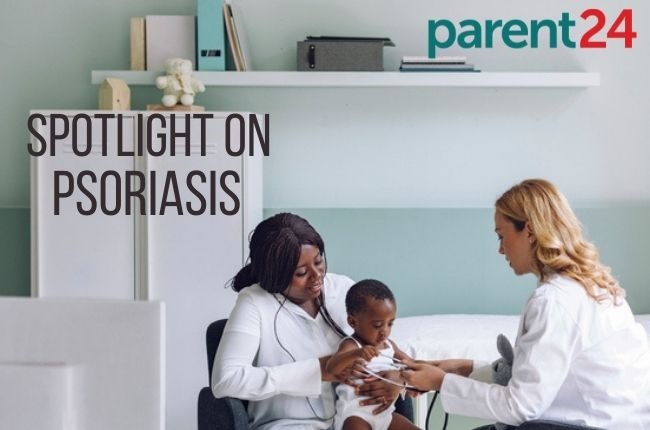
- If your child has a seemingly ongoing scaly rash in the nappy area, he or she may have psoriasis.
- It's extremely uncommon in children younger than 10, and the "diagnosis can be tricky".
- A local expert shares the symptoms and what parents should know to avoid a misdiagnosis.
Having a newborn baby is overwhelming enough and if they show signs of illness, it can be really scary.
Parent24 put together a series on common infant illnesses to guide you at times when your baby is sick.
Together with a local paediatrician or doctor, we'll help you decide when to panic. It's probably not as serious as you think, but let's be sure.
Catch more instalments of our #infantillness series here.
A typical concern:
"Why is my baby's nappy area constantly inflamed? There are patches of rash which seem scaly, and sometimes there is a bit of bleeding just underneath the skin. What could it be?"
Answer
Your baby might have psoriasis.
According to Dr Elelwani Mathivha, psoriasis "is a chronic inflammatory condition where regulation of the division of skin cells is lost".
The paediatrician, who practises at the Netcare Femina Hospital in Pretoria, says psoriasis is rarely diagnosed in infants.
"Psoriasis usually presents within the first two decades of life, but only about 10% of patients will present before the age of 10," she told Parent24. She added: "In the rare instance that it occurs, lesions may be noted in infancy, usually presenting as nappy psoriasis".
What causes psoriasis?
Dr Mathivha explains that the cause of the skin condition is mainly unknown. However, experts have pinpointed a "psoriasis susceptibility gene," which increases the likelihood of developing the condition.
"Other factors that may increase the risk of developing psoriasis are infection (especially streptococcal) and stress," Dr Mathivha says.
ALSO READ | Spots and rashes on baby? Here's what's normal and when to visit a doctor
Symptoms to look out for:
According to Mathivha, symptoms of psoriasis include:
- dry, thickened, well-defined skin lesions that are often itchy;
- shiny scales that become white or opaque when scratched; and
- small bleeding points on the underlying skin that develop as a result of the scales
"Other constitutional symptoms like fever are usually absent, and the baby is otherwise well".
Similar conditions
Since the condition is rare in babies, the Netcare paediatrician says "diagnosis can be tricky."
According to Dr Mathivha, conditions that present with similar symptoms include the following:
- Scalp lesions, like ringworms (tinea capitis), can present in a similar way.
- Ringworms on the body (tinea corporis) and seborrheic and atopic dermatitis can also be confused with psoriasis.
- Post-infectious (Guttate) psoriasis can be confused with viral rashes.
- Nappy dermatitis can also look like diaper psoriasis. Nail psoriasis can also be confused with fungal infection of the nails (onychomycosis).
How long will it last, and how is it spread?
"Unfortunately, psoriasis is a chronic lifelong condition," Mathivha says. However, it is by no means contagious.
Treatments
Dr Mathivha says that following initial diagnosis and consultation with a doctor, home treatment is usually prescribed.
"Only severe cases that fail first-line outpatient treatment may require intravenous therapy administered in hospital," she says.
When to call the doctor
Dr Mathivha advises parents not to wait too long if they spot "any abnormal lesions" on their babies' skin.
"It is advisable to urgently see a doctor whenever parents notice rough, thick, uneven skin with flaky scales that can easily be scraped off. Nappy dermatitis that does not respond to treatment also needs a doctor consultation. Children who have or recently had an infection such as tonsillitis that is followed by sudden raindrop-like lesions on the trunk, also need to be evaluated".
Also see: The top 9 milestones your child will reach in their first year
Tips and advice for parents
"Due to the chronic nature of the condition, patients usually have flare-ups/exacerbations that are followed by a period of remission. This cycle can be physically and mentally exhausting, especially in severe cases, so psychological support is highly recommended. Psychological support is also particularly helpful for children as this condition can negatively affect their self-esteem and productivity in school and everyday life. Support groups can also offer invaluable benefit," she says.
You can also ask a doctor or paediatrician directly via Health24 here: Ask an Expert
Chatback:
Share your stories and questions with us via email at chatback@parent24.com or via our subscriber exclusive WhatsApp line on 066 010 0325. Anonymous contributions are welcome.
Don't miss a story!
For a weekly wrap of our latest parenting news and advice, sign up to our free Friday Parent24 newsletter. Also, just for subscribers, we have an education-themed newsletter: sign up for Bright Spark here.




 Publications
Publications
 Partners
Partners











